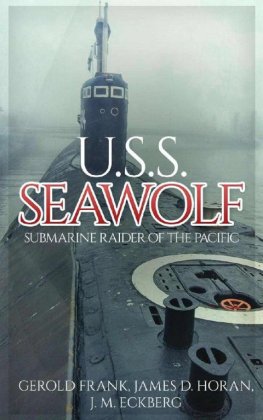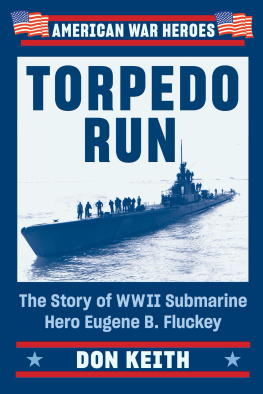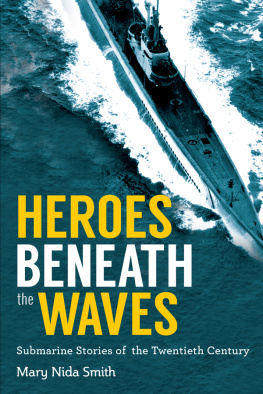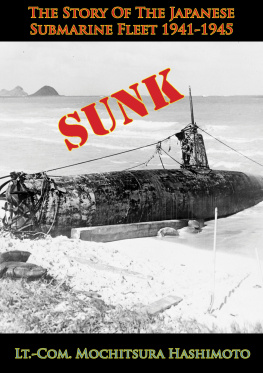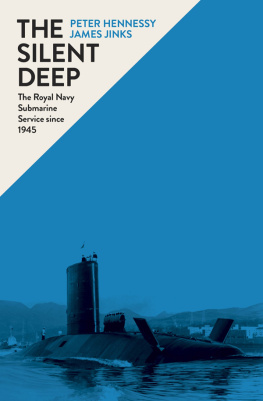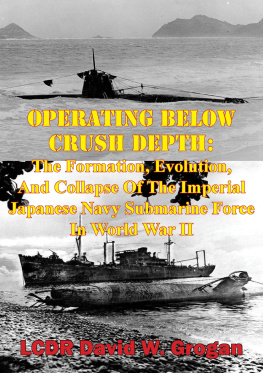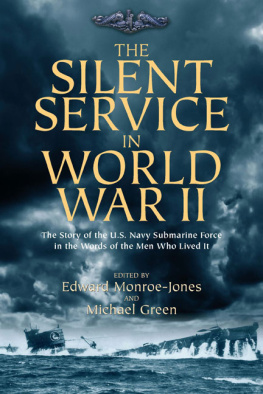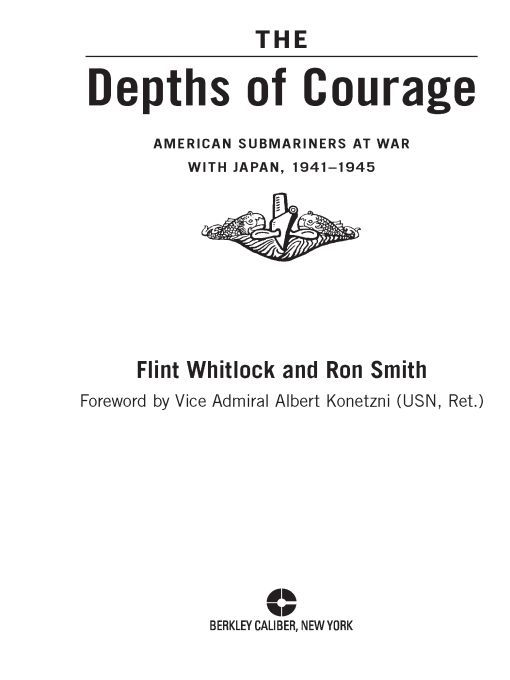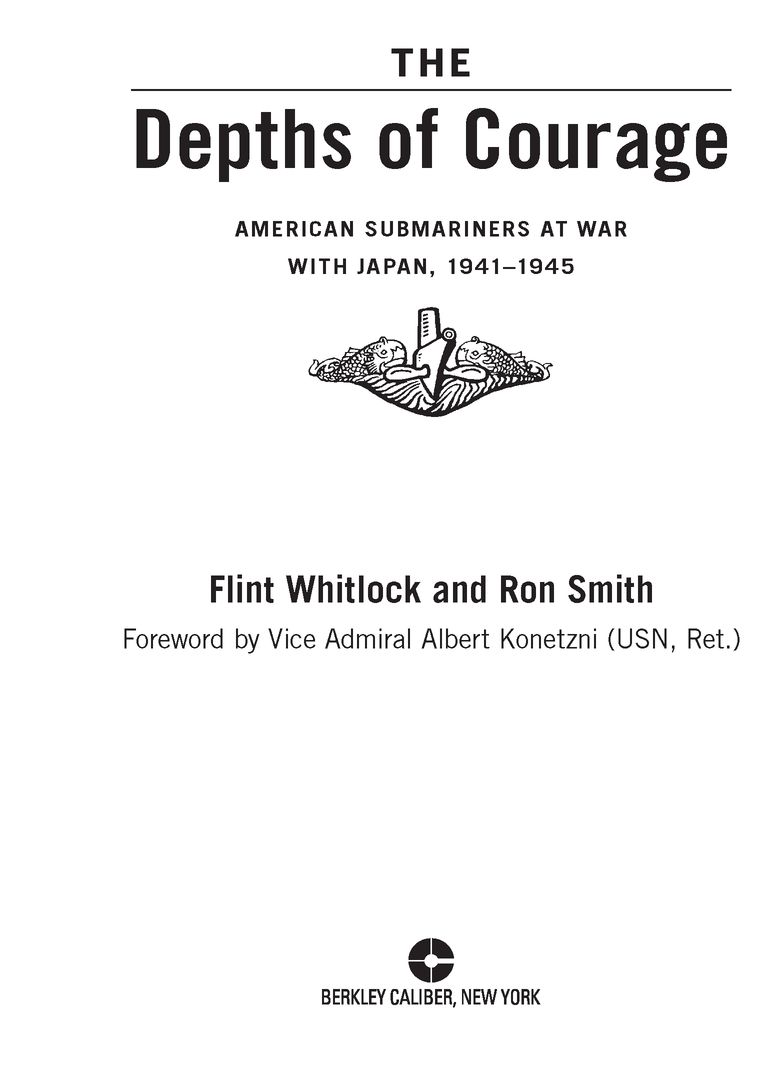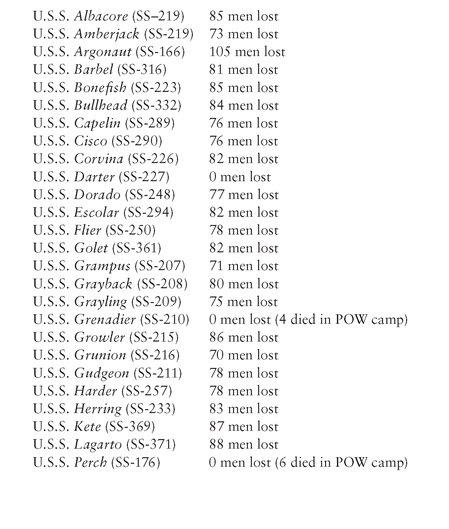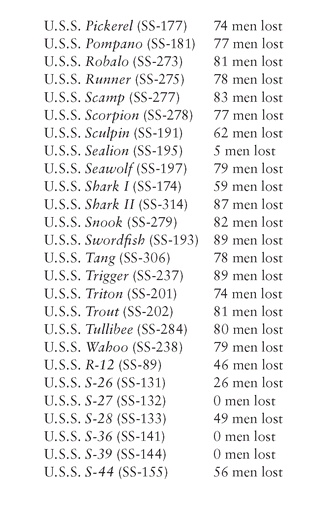Table of Contents
During the dark, early months of WWII, it was only the tiny American
force that held off the Japanese Empire and enabled our fleets to replace
their losses and repair their wounds. The spirit and courage of the Submarine
Force shall never be forgotten.Admiral Chester W. Nimitz,
Commander-in-Chief, U.S. Navy Pacific Fleet
Brings the drama and heroism to the readers doorstep... Only submariners understood the fear, hardships, and rewards of serving in such a specialized branch of the wartime Navy. Whitlocks powerful book ensures that readers will now comprehend some of that.
John Wukovits,
author of One Square Mile of Hell
A lively account of wartime U.S. Pacific submarines that expresses the
claustrophobia of fighting boats undergoing depth charges and the other
dangers of the deep in the war against Japanese shipping. The highlights
of heroic war patrols are interwoven with personal submariners stories,
particularly Ron Smiths progress through boot camp, torpedo school,
and sub school, climaxing with exciting war patrols aboard the fleet boat
USS Seal. All in all, a rousing good read.William Tuohy,
author of The Bravest Man
A tale of incomparable courage. The depth of [the authors] scholarly research
is evident in the fast-paced narrative, relating vignettes of the mundane,
the heroic, and the harrowing in the U.S. Navy of World War II.
Together, these outstanding authors have provided an eloquent voice to
the Silent Service. Michael E. Haskew,
editor, WW II History magazine
An authoritative and adventurous account of the submarines and submariners of the Pacific War. It will inform a new generation of both victors and vanquished of the courage and bravery of these singular seamen. But, it is also a very human story that makes for compelling reading.
Dirk A. Ballendorf,
Professor of History and Micronesian Studies,
University of Guam
Most Berkley Caliber Books are available at special quantity discounts for bulk purchases for sales promotions, premiums, fund-raising, or educational use. Special books, or book excerpts, can also be created to fit specific needs.
For details, write: Special Markets, The Berkley Publishing Group, 375 Hudson Street, New York, New York 10014.
Also by Ron Smith
TORPEDOMAN
Also by Flint Whitlock
SOLDIERS ON SKIS:
A PICTORIAL MEMOIR OF THE 10TH MOUNTAIN DIVISION
THE ROCK OF ANZIO:
FROM SICILY TO DACHAUA HISTORY OF THE 45TH INFANTRY DIVISION
THE FIGHTING FIRST:
THE UNTOLD STORY OF THE BIG RED ONE ON D-DAY
GIVEN UP FOR DEAD:
AMERICAN POWS IN THE NAZI CONCENTRATION CAMP AT BERGA
DISTANT BUGLES, DISTANT DRUMS:
THE UNION RESPONSE TO THE CONFEDERATE
INVASION OF NEW MEXICO
CAPT. JEPP AND THE LITTLE BLACK BOOK:
HOW EX-BARNSTORMER AND AVIATION PIONEER
ELREY B. JEPPESEN MADE THE SKIES SAFER FOR EVERYONE
THE NAVY HYMN
Eternal Father, strong to save,
Whose arm hath bound the restless wave,
Who biddst the mighty ocean deep
Its own appointed limits keep;
Oh, hear us when we cry to Thee,
For those in peril on the sea!
Oh Father, King of earth and sea,
We dedicate this ship to thee.
In faith we send her on her way;
In faith to Thee we humbly pray:
Oh, hear from heaven our sailors cry
And watch and guard her from on high!
During the dark, early months of World War II, it was only the tiny American submarine force that held off the Japanese Empire and enabled our fleets to replace their losses and repair their wounds. The spirit and courage of the Submarine Force shall never be forgotten.
Admiral Chester W. Nimitz
Commander in Chief, Pacific
This book is respectfully dedicated to the memory of the 3,453 men of the United States Navy Submarine Force who lost their lives during World War II and to the fifty-two American submarines that failed to return:
FOREWORD
THEY were iron men who took iron ships to sea and left an unparalleled record of courage and duty, faithfully performed. Less than 2 percent of U.S. sailors served in submarines, yet submarines would sink 55 percent of all Japanese ships lost in World War IImore than the U.S. Navys surface ships, its carrier planes, and the Armys Air Force combined! Yet, for its many vital achievements, the submarine force paid a terrible price in the war. Fifty-two boats and more than 3,400 submarinersone out of every fivefailed to return.
Ive had the great fortune over the years to serve as a career submariner. During and after my thirty-eight years of service, Ive had, and continue to have, the distinct privilege of knowing these iron men, these submarine veterans of World War II.
Vice Admiral Charles Uncle Charlie Lockwood, a commander of the U.S. Submarine Force during the war in the Pacifican assignment I had some fifty years laterwrote of these men with which he served, They were no supermen, nor were they endowed with any supernatural qualities of heroism. They were merely top-notch American lads, well trained, well treated, well armed, and provided with superb ships.
The submarine veterans of World War II have provided their successors in the submarine force powerful traditions that continue to serve the submarine force well.
First of these is the tradition that demands forceful backup of each crew membera tradition that makes it known that each and every crew member regardless of seniority is critical to the safe operation of the ship.
Second is the tradition that submariners take care of one another. Life in submarines is one without physical or psychological privacy. Our veterans have instilled in us all a realization that this lack of privacy demands complete mutual respect of others. These veterans taught us the true meaning of mentoring before it became an overly used word in leadership and management books.
Finally, these veterans provided the catalyst for continuous improvement of the submarine force. During the war, they solved major problems in tactics, weaponry, and selection of leaders at all levels. It was this continuous improvement that resulted in major post-world-war developments in the use of passive sonar ranging, nuclear energy, and cold-war tactics against the Soviet Union.
Sadly, today our nation faces many of the same problems our submarine force faced prior to and early in World War II. Tragically, we Americans dont understand history. The strong traditions our veterans provided us have made our submarines a dominant force for national defense. Our ability to take the fight to potential enemies and stay for months without resupply are strong arguments for a robust submarine force. The missions that our submarines carry out in peacetime, the onset of conflict, and during hot war are not transferable to other forces.



